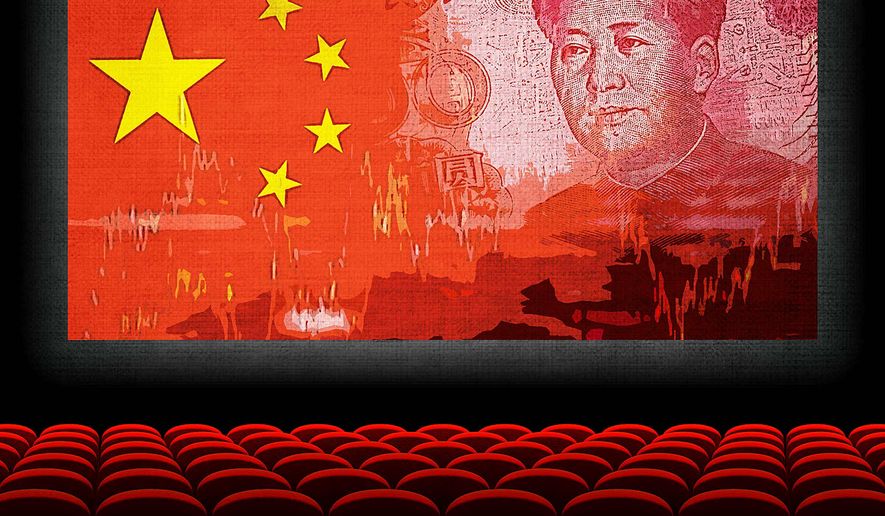OPINION:
It’s the heart of the summer movie blockbuster season. Facing fierce competition from Netflix and other similar platforms for high-quality, commercial-free TV, the movie industry is relying on this time of the year more than ever.
Many of these blockbusters receive an added boost from the international box office — China in particular. Last year, the Chinese box office generated $2.6 billion for U.S. films. And China is expected to surpass the United States next year as the biggest moviegoing market in the world.
But movie producers’ gain is moviegoers’ loss. As profitability has increasingly become dependent on foreign viewers, studios have altered their movies to fit Chinese tastes. That means more action flicks and fewer dramas. More PG movies and fewer R-rated ones. And a seemingly endless supply of superhero sequels.
More sinisterly, it also means altering movies to comply with the communist Chinese government’s propaganda and censorship agency, the State Administration of Press, Publication, Radio, Film and Television (SAPPRFT). Officially that means no depictions of the supernatural, no displays of “gratuitous violence,” and no reinterpretations of history (surely, the Chinese version of it).
Unofficially, it also means no unfavorable depictions of China (e.g., the Chinese military) and limits on favorable depictions of Americans — especially in relation to the Chinese.
The 2012 remake of “Red Dawn” had to be altered in post-production to make the invaders appear to be North Korean rather than Chinese. “Captain Phillips” and the 3-D version of “Top Gun” were rejected for theaters in China because they portrayed the U.S. military in a positive light. And “Mission Impossible III” and “Skyfall” had to cut scenes that made China look bad.
Because the monetary implications of Chinese distribution are so high, producers self-censor or accept any changes required by SAPPRFT. That means the summer blockbusters at theaters right now have been “redwashed” of anything the Chinese government doesn’t like.
China’s growing control of the movie industry also exists downstream. AMC Theaters is owned by the Dalian Wanda group, whose board members have ties to the communist government. AMC is currently finalizing a merger with Carmike Cinemas that will make it the biggest movie chain in the United States with more than 8,000 theater screens. With that choke hold on distribution, China has the power to prevent showing movies unacceptable to the Chinese government. That is a not-too-subtle intimidation of those who write movie scripts as a business.
Though it’s unlikely Quentin Tarantino-style gruesome flicks or M. Night Shyamalan supernatural ones won’t be shown by AMC, it’s also unlikely you’ll see any feature films highlighting China’s brutal human rights abuses at AMC or Carmike theaters near you anytime soon.
The implications of this control over the movie industry go beyond just dampening your summer escapism. This is a “soft power” offensive that the Chinese Communists employ — one that is well-documented in the book “The Hundred-Year Marathon,” by former Reagan administration official Michael Pillsbury. Incredibly, it is one they openly acknowledge.
This is an insidious threat to our national security. Public opinion is created downstream from pop culture. And government policy is determined by public opinion. China leaders understand their substantial control of the movie industry can influence U.S. policy.
So what can be done to limit this foreign control of pop culture? An interagency U.S. government committee called the Committee on Foreign Investment in the United States already exists to prevent foreign investment in the United States that might pose a threat to national security. This is the government arm that would stop a Chinese government-backed firm from buying an American weapons manufacturer. Its charter should be expanded further to protect against soft-power communications targets, including movies, radio transmission operations and newspapers.
Congress and the Department of Justice should also review the longstanding Foreign Agents Registration Act, which requires disclosure when foreign entities seek to lobby or influence the public through propaganda or other means. By requiring the disclosure of foreign-owned media prone to censorship, the American public would gain a better understanding of foreign propaganda plays — and their impact on U.S. public opinion.
In addition, the Securities and Exchange Commission should require that public companies’ filings disclose ties to foreign governments. As it stands now, the scope of Chinese (and possibly other) forms of foreign censorship in Hollywood — seemingly material information — is difficult for investors and potential investors to discern.
Finally, the White House and Congress should encourage Hollywood studios to adopt a voluntary code for films similar to the parental guidance ratings system that would tell viewers whether their movies have been subject to government censorship.
China recognizes that broad, multiplatform communications are tools to form public opinion and implement social controls in other countries. It’s time for the United States to recognize the concept as well.
• Richard Berman is the president of Berman and Company, a public affairs firm in Washington, D.C.




Please read our comment policy before commenting.